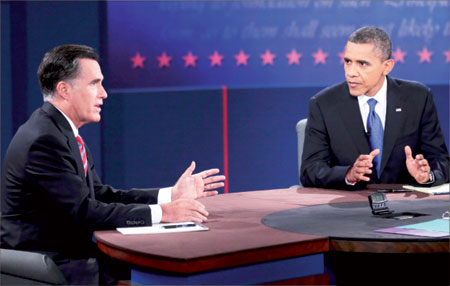China remains key debate issue
|
US Republican presidential nominee Mitt Romney (left) and US President Barack Obama speak during the final presidential debate in Boca Raton, Florida. Scott Audette / Reuters |
Obama, Romney share similar views over economic ties: Expert
The approaches of US President Barack Obama and Republican presidential nominee Mitt Romney to China seemed to converge in their last debate Monday night, when Obama shifted roles by calling the country both an "adversary" and a "potential partner" while his Republican challenger softened his campaign rhetoric by stressing China's desire for a "free and open" world and saying it doesn't have to be an adversary.
Romney said China stands to lose more from a bilateral trade war than the United States because it benefits from the two countries' imbalance in trade.
Obama said his administration's enforcement of international trade rules have helped boost US trade competitiveness with China, and he blasted Romney for proposing policies that would cut funding for education and technological research needed to extend that improvement over the long term.
"China has an interest that's very much like ours, in one respect," Romney said in the final block of the foreign-policy-themed debate at Florida's Lynn University. "And that is they want a stable world; they don't want war; they don't want to see protectionism; they don't want to see the world break out into various forms of chaos because they have to manufacture goods and put people to work."
Saying China has "about 20 million people" new job-seekers in industry each year, the country wants "the economy to work and the world to be free and open. And so we can be a partner with China - we don't have to be an adversary in any way, shape or form. We can work with them, we can collaborate with them - if they're willing to be responsible."
Both candidates attacked each other over outsourcing of US manufacturing jobs to China. Obama said Bain Capital, the private-equity firm Romney founded, invested in companies that sent technology jobs abroad.
Kenneth Lieberthal, China expert at the Brookings Institution, said that it is a little bit "surprising" to see Romney sound like Obama at the debate when the Republican expected a positive relationship with China.
"Throughout the whole debate, Romney tried to conveyed that he is a reality moderate on foreign policy," he said.
He said both shared fundamentally same views that the United States can have great future with China with the big concern is economic relationship; and the Americans need firstly to get its own house in order before dealing with other countries.
With the US presidential election just two weeks away, the candidates hit the stage Monday focused on the topic of foreign policy at the last of their three televised debates. "The rise of China and tomorrow's world" came up as a subtopic during the last part of their tete-a-tete, after discussions on "America's role in the world; "our longest war - Afghanistan and Pakistan; red lines - Israel and Iran; and the changing Middle East and the new face of terrorism".
CNN poll after the debate showed that 48 percent of Americans think Obama won the debate against 40 percent for Romney.
"I think both did well tonight, but Obama did better,".said Bonnie Glaser, Asian security expert at the Center for Strategic and International Studies.
"Romney's views on China and his policy, if elected, remain unclear. He continues to insist he would label China a currency manipulator on day one in office, but he seems to appreciate the need for a cooperative relationship with China overall."
Some China specialists in the US have praised Obama over his China policy, which seeks to build "positive, cooperative and comprehensive relations" with the Asian country.
Since taking office in January 2009, there have been an unprecedented number of high-level exchanges between Chinese and US officials, including 12 meetings between President Hu Jintao and Obama, the annual Strategic and Economic Dialogue, the Joint Commission on Commerce and Trade, and military exchanges.
During his re-election campaign, Obama has said he would bring more American jobs back by reforming the tax code to make outsourcing less financially attractive for US companies.
Jonathan Pollack, an Asia-Pacific security expert at the Brookings Institution, said that although both candidates emphasize the US need to maintain substantial military capabilities in the region, Romney seeks to accelerate a US buildup beyond what the Obama administration has proposed.
"Romney places far more emphasis on the military component of US policy, whereas Obama envisions deeper political, economic, and diplomatic involvement in the region, including with China," he said.
US-China Business Council President John Frisbie said Washington should focus on more engagement with China instead of confrontation.
"Both presidential candidates have said they will "get tough" on China, but evidence has shown that the best way to make progress is through comprehensive engagement and legal actions - not political rhetoric," he said.
For example, US's engagement has led to China's exchange rate appreciated by more than 30 percent since 2005, he added.
A recent survey by the USCBC shows that more than 90 percent of US companies invested in China mainly to serve the Chinese market, not to outsource production and export back to the US.
Since 2000, US exports to China have soared 542 percent by only by 80 percent to the rest of the world. China is now the United States' second-biggest trading partner, eclipsed only by Canada, and the No 3 market for US exports, after Canada and Mexico.
Contact the writers at tan-yingzi@chinadailyusa.com and josephboris@chinadailyusa.com

























